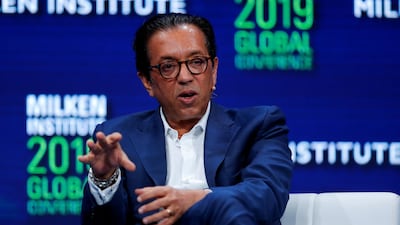Japan’s SoftBank Vision Fund, the world’s largest venture capital fund, is looking to increase its investments in India, as it seeks to leverage opportunities for its second fund that come about from the credit crisis in Asia’s third largest economy, its chief executive said.
"We are looking at insurance and lending businesses," Rajeev Misra, the chief executive of SoftBank Investment Advisers, which oversees the firm's Vision Fund, told The National.
The company already has PayTM, an ecommerce instant payment company, in the portfolio of its first $100 billion (Dh367bn) fund. Policy Bazaar, an online platform that compares insurance policies, is the second company in India that SoftBank has a stake in. PayTM, in which SoftBank has a 20 per cent interest, recently raised $1bn in funding and will now also “go into lending”, Mr Misra said.
On Monday, Moody's Investors Service reduced its economic growth projections for India to 4.9 per cent from 5.8 per cent for the country’s 2018-19 fiscal year. Weak household consumption will curb economic growth and weigh on the credit quality of Indian issuers in a range of sectors, the agency said.
Government measures to stimulate domestic demand in India will be limited in offsetting the slowdown, and although a modest recovery is expected next year, economic growth will be weaker than that of recent years, which will have negative credit implications for Indian issuers, the agency said. The credit crunch among non-bank financial institutions, which have been major providers of retail loans in recent years, has exacerbated the slowdown, according to Moody's.
This is precisely where SoftBank’s Vision Fund sees opportunity for its second fund as companies looking to grow turn to it for capital.
“For a country to grow it needs the availability of credit,” said Mr Misra. “SMEs [small and medium-sized enterprises] need money, consumers need lending. You will never see us put money into a public bank, that’s not us, our investment thesis requires a technology angle, it has to use AI [artificial intelligence], data science, so we are actively looking.”
The investment threshold of the second fund could be reduced from $100 million, so the ticket size may come down and the number of total investments might be twice as much as the first fund, according to people familiar with the matter.
“If you look at the internet revolution, between 1999-2019 it created several companies that have changed the world like Google, Amazon, Facebook, Alibaba and Tencent,” said Mr Misra. “We believe the AI revolution will have a bigger impact on value creation because it will impact every part of the economy. Of the $85 trillion gross domestic product of the world, it will disrupt all of it while the internet only disrupted around 15 per cent of the GDP.”
Mr Misra, a veteran banker who built a career at UBS, Deutsche Bank and Merrill Lynch, is unfazed by the recent woes of WeWork, where the fund had to write down $9bn on its stake in the company, after the office space start-up abandoned its intial public offering (IPO) plans.
The fund is now two-and-a-half years old. As of September the portfolio was up $11.4bn and has distributed $9.9bn to investors in returns. As is the case in building an investment portfolio, there is a general acceptance that some choices will produce better results and others will disappoint.
The fund has seen two exits to date, and may see up to 10 of the companies it has invested in, go public by the end of next year, according to people familiar with the matter.
Unlike private equity and venture capital firms that invest with a view to exiting an entity in a short time frame, Mr Misra and his boss Masayoshi Son are betting long term.
Mr Son, who once nearly went bankrupt, is the richest man in Japan and has a record rate of return on his investments averaging 44 per cent over 18 years before he launched the fund in 2017.
“We are investing in transformative companies that are using data science and AI to disrupt industries across different geographies in the world; we are industry agnostic,” said Mr Misra.
Of its broad portfolio Oyo, Firstcry, Katerra, Sense Time, Zymergen, Greensill, Automation Anywhere, Tech Hub are already operating in the UAE or plan to set up base in the Emirates.


